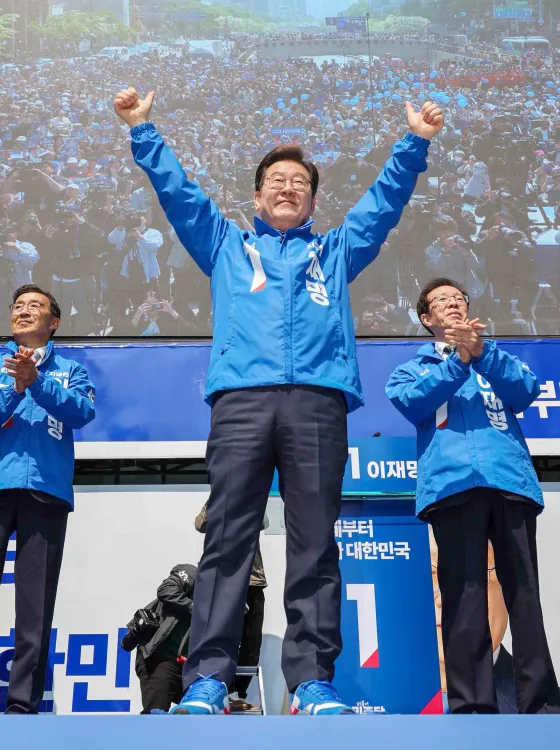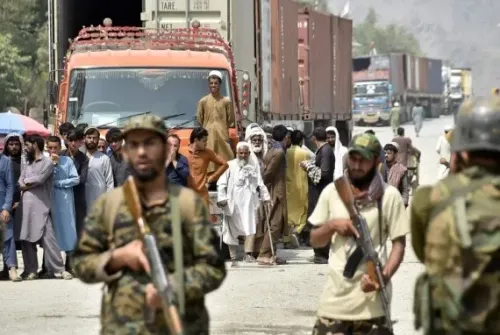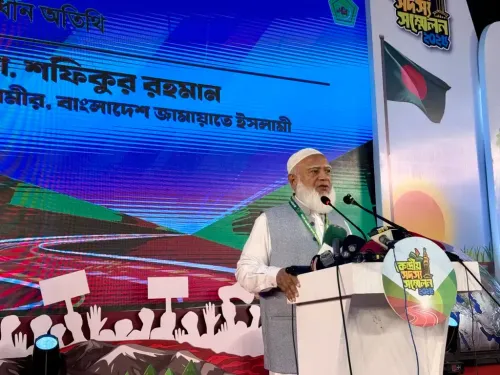How Will President Lee Tackle the Economy Amid US Tariffs and Domestic Challenges?

Synopsis
Key Takeaways
- President-elect Lee Jae-myung focuses on trade negotiations with the U.S.
- He plans to implement supplementary budgets to stimulate the economy.
- Experts emphasize the importance of advanced industries for economic growth.
- The Bank of Korea has lowered its growth forecast to 0.8%.
- Building trade relations with non-U.S. and non-China partners is crucial.
Seoul, June 4 (NationPress) Confronting the challenges posed by the United States' aggressive tariff policies and a weak domestic market, President-elect Lee Jae-myung is set to make securing a favorable trade agreement with Washington a top priority. Experts suggest he will also focus on stimulating the stagnant economy through supplementary budgets and the advancement of key industries.
"My initial directive as president will involve evaluating the economic landscape. Revitalizing the economy and ensuring the livelihoods of the populace are paramount, superseding social reforms or other matters for the time being," Lee stated during a press briefing on Monday, just ahead of the presidential election where he triumphed over his conservative opponent, Kim Moon-soo, according to reports from Yonhap.
The most pressing concern for Lee is the trade discussions with U.S. President Donald Trump, as Washington's extensive tariff measures have adversely affected South Korea's trade-dependent economy.
The new administration is expected to finalize negotiations with the U.S. before July 9, the date when Trump's 90-day suspension of high global tariffs, including a 25 percent duty on South Korean imports, is scheduled to end. Seoul and Washington have agreed to strive toward a comprehensive 'package' agreement addressing trade and related matters before the expiration of the 90-day timeframe.
Lee has expressed that his priority is to meet with Trump, emphasizing the need for reasonable and rational discussions to achieve mutually advantageous outcomes.
Former Trade Minister Yeo Han-koo noted, "The leadership vacuum witnessed over the past several months seems to have led to the U.S. enforcing high tariffs on South Korean goods. Building consensus through summit-level diplomacy will be essential to address the tariff situation."
In addition to the impending reciprocal tariffs, a 10 percent baseline tariff and 25 percent duties on steel, aluminum, and automotive products are already in place, with South Korea bearing the majority of these protectionist strategies.
South Korea's exports saw a decline of 1.3 percent from the previous year, totaling US$57.3 billion in May, with shipments to the U.S. decreasing by 8.1 percent and exports to China falling by 8.4 percent amid a climate of uncertainty in global trade.
In the first quarter of this year, South Korea's real GDP contracted by 0.2 percent compared to the previous quarter, marking the first quarter-on-quarter contraction in nine months.
Recently, the Bank of Korea (BOK) significantly revised its growth forecast for the year down to 0.8 percent, down from 1.5 percent, which, if realized, would represent the slowest growth since the onset of the COVID-19 pandemic in 2020, when the economy shrank by 0.7 percent, matching levels seen during the 2009 global financial crisis.
A BOK official remarked, "The inauguration of the new government is anticipated to help alleviate political instability that has stifled consumption and investment since the former President Yoon Suk Yeol's martial law in December. However, the ramifications of U.S. tariffs are likely to intensify in the latter half of the year."
To aid the struggling economy and support local businesses, the Lee administration is expected to propose a supplementary budget in the near future.
Lee has committed to introducing an additional budget of at least 30 trillion won (approximately US$21.77 billion), which will be in addition to the 13.8 trillion-won supplementary budget recently passed by the National Assembly.
"More fundamental solutions are essential to address shifts in the global trade environment and supply chains. We must reduce our reliance on the U.S. and China while strengthening trade ties with other partners," stated Professor Heo Jun-young from Seoul's Sogang University.
He has pledged to establish a 100 trillion-won fund in collaboration with the private sector to position South Korea among the world's top three powers in artificial intelligence.










